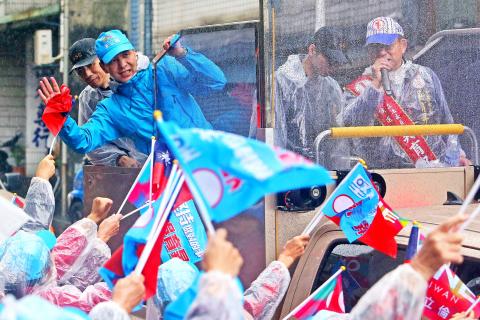Chinese Nationalist Party (KMT) presidential candidate Eric Chu (朱立倫) yesterday braved heavy rain to canvass for votes in Taichung — one of the administrative regions the party considers a decisive battleground in Saturday’s presidential and legislative elections.
Chu, wearing a light-blue jacket and a hat displaying his campaign slogan: “One Taiwan,” arrived in Taichung yesterday morning as scheduled and boarded a vehicle with bulletproof glass.
Chu originally planned to canvass the streets with six of the KMT’s eight candidates who are running for regional legislative seats in the city one-by-one. The six candidates are Yen Kuan-heng (顏寬恒), Shen Chih-hwei (沈智慧), Tsai Chin-lung (蔡錦隆), Lu Shiow-yen (盧秀燕), Yang Chung-ying (楊瓊瓔) and Johnny Chiang (江啟臣).

Photo: AFP
However, Yen was not present due to a scheduling conflict and entrusted his younger sister, Taichung City councilor Yen Li-ming (顏莉敏) of the KMT, to hit the road with Chu on his behalf.
Yen Kuan-heng’s father, former Non-Partisan Solidarity Union legislator Yen Ching-piao (顏清標) — whose family enjoys strong local ties and networks in the city — also came to greet Chu in his son’s stead.
“I have seen that in spite of the heavy rain, many of our supporters are still ardent and enthusiastic... Even though I am soaking wet, wind and rain can bring confidence and I would not let them stop me,” Chu said.
Chu dismissed concerns that Yen Kuan-heng’s absence yesterday is an indication that the KMT leadership is losing its grip on local fractions in Taichung, saying the decision to include Yen Kuan-heng in his street-canvassing schedule was made at the last minute.
“People have read too much into this. Initially, we planned to head directly to the city’s downtown area, but later decided to make another stop [at Yen Kuan-heng’s campaign headquarters],” Chu said.
Asked why Taichung was included in his last-stage campaign schedule and was also the first city he visited after securing the KMT’s nomination as its presidential candidate in October last year, Chu said he regards Taichung as extremely important.
Chu said central Taiwan is undoubtedly a decisive battleground in the upcoming election and the KMT is determined to beat the Democratic Progressive Party (DPP) in the area.
The KMT lost Taichung to the DPP in the 2014 nine-in-one elections, after the city had been governed by former KMT vice chairman Jason Hu (胡志強) for 13 years.
The final stop in Chu’s vehicle procession was the Tzu Chi Temple (慈濟宮) in the city’s Fongyuan District (豐原), where the KMT candidate prayed to the sea goddess Mazu (媽祖) for victory in Saturday’s elections.
Chu traveled back to New Taipei City in the afternoon, where he canvassed in Wugu (五股), Lujhou (蘆洲) and Sanchong (三重) districts.
Meanwhile, Chu’s wife, Kao Wan-chien (高婉倩), visited a traditional market in New Taipei City’s Banciao District (板橋) yesterday morning to solicit support for her husband.
Accompanied by KMT legislative candidate Lin Kuo-chun (林國春) and Lin’s wife, Kao shook hands with vendors and doled out campaign-themed disposable hand warmers to onlookers.

The US government has signed defense cooperation agreements with Japan and the Philippines to boost the deterrence capabilities of countries in the first island chain, a report by the National Security Bureau (NSB) showed. The main countries on the first island chain include the two nations and Taiwan. The bureau is to present the report at a meeting of the legislature’s Foreign Affairs and National Defense Committee tomorrow. The US military has deployed Typhon missile systems to Japan’s Yamaguchi Prefecture and Zambales province in the Philippines during their joint military exercises. It has also installed NMESIS anti-ship systems in Japan’s Okinawa

‘WIN-WIN’: The Philippines, and central and eastern European countries are important potential drone cooperation partners, Minister of Foreign Affairs Lin Chia-lung said Minister of Foreign Affairs Lin Chia-lung (林佳龍) in an interview published yesterday confirmed that there are joint ventures between Taiwan and Poland in the drone industry. Lin made the remark in an exclusive interview with the Chinese-language Liberty Times (the Taipei Times’ sister paper). The government-backed Taiwan Excellence Drone International Business Opportunities Alliance and the Polish Chamber of Unmanned Systems on Wednesday last week signed a memorandum of understanding in Poland to develop a “non-China” supply chain for drones and work together on key technologies. Asked if Taiwan prioritized Poland among central and eastern European countries in drone collaboration, Lin

NO CONFIDENCE MOTION? The premier said that being toppled by the legislature for defending the Constitution would be a democratic badge of honor for him Premier Cho Jung-tai (卓榮泰) yesterday announced that the Cabinet would not countersign the amendments to the local revenue-sharing law passed by the Legislative Yuan last month. Cho said the decision not to countersign the amendments to the Act Governing the Allocation of Government Revenues and Expenditures (財政收支劃分法) was made in accordance with the Constitution. “The decision aims to safeguard our Constitution,” he said. The Constitution stipulates the president shall, in accordance with law, promulgate laws and issue mandates with the countersignature of the head of the Executive Yuan, or with the countersignatures of both the head of the Executive Yuan and ministers or

CABINET APPROVAL: People seeking assisted reproduction must be assessed to determine whether they would be adequate parents, the planned changes say Proposed amendments to the Assisted Reproduction Act (人工生殖法) advanced yesterday by the Executive Yuan would grant married lesbian couples and single women access to legal assisted reproductive services. The proposed revisions are “based on the fundamental principle of respecting women’s reproductive autonomy,” Cabinet spokesperson Michelle Lee (李慧芝) quoted Vice Premier Cheng Li-chiun (鄭麗君), who presided over a Cabinet meeting earlier yesterday, as saying at the briefing. The draft amendment would be submitted to the legislature for review. The Ministry of Health and Welfare, which proposed the amendments, said that experts on children’s rights, gender equality, law and medicine attended cross-disciplinary meetings, adding that